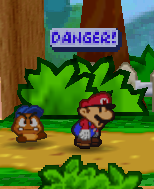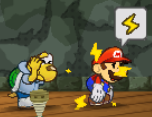Danger: Difference between revisions
m (Text replacement - "Paper Mario Status Effects" to "Paper Mario status effects") |
m (Text replacement - "Paper Mario: Color Splash Status Effects" to "Paper Mario: Color Splash status effects") |
||
| Line 40: | Line 40: | ||
[[Category:Paper Mario: The Thousand-Year Door Status Effects]] | [[Category:Paper Mario: The Thousand-Year Door Status Effects]] | ||
[[Category:Super Paper Mario status effects]] | [[Category:Super Paper Mario status effects]] | ||
[[Category:Paper Mario: Color Splash | [[Category:Paper Mario: Color Splash status effects]] | ||
[[it:Pericolo]] | [[it:Pericolo]] | ||
Revision as of 10:29, August 30, 2021
Danger is a status effect that appears in all Paper Mario games. It occurs when Mario's or any of his Partner's HP reaches a specific low amount, causing a bubble with the words 'Danger' to appear above them. An alarm sound is also played on repeat to remind the player to use healing items. A similar status, Peril, also appears alongside it.
Appearances
Paper Mario and Paper Mario: The Thousand-Year Door
In the first two installments of the Paper Mario series, Danger is a status that automatically occurs when Mario or his partner's HP is in the range of 2 to 5 points. If a character's HP reaches 1, however, Danger is overridden by the Peril status, which occurs with a similar, higher-pitched alarm playing. Several special badges are activated, namely Power Rush, Close Call, and Last Stand which will not lose their effect until the player is no longer in Danger. Additionally, introduced in Paper Mario: The Thousand-Year Door, Danger badges reappear along with new partner-only counterparts, which are Power Rush P, Close Call P, and Last Stand P. Danger badges do not lose their effect when in Peril, and will actually stack with Mega Rush and Mega Rush P, the only Peril-activated badges. The partner-only badges do not appear in Paper Mario due to partners lacking their own HP in such game. It should also be noted that Mario or any of his partners can put themselves in Danger permanently by using Chet Rippo to lower their max HP to 5.
Super Paper Mario
Danger appears again in Super Paper Mario, with a different criteria for activating. Instead of being activated by a character having 5-2 HP, it instead occurs when any given character has less than 20% of their max HP. As badges do not exist in this installment, Danger has no practical use other than to remind the player to heal themselves.
Paper Mario: Sticker Star, Paper Mario: Color Splash and Paper Mario: The Origami King
Danger appears again in Paper Mario: Sticker Star, and its sequels, Paper Mario: Color Splash and Paper Mario: The Origami King. Unlike in past installments, an alarm for the status does not play. Instead, the battle music becomes off-key and sloppy. Similarly to Super Paper Mario, it is activated when Mario has 30% or lower of his max HP. Unlike in past installments, enemies are also visibly affected when low on HP. Additionally, characters lose some of their color when in this state in Color Splash. In The Origami King, the name tag of the enemy is displayed in orange while they are in this state.
Strategies
Despite the fact that Danger leaves Mario or one of his partners in a vulnerable state, a strategy dubbed as "Danger Mario" is employable in the first two games. By stacking Power Rush badges, Mario can do large amounts of damage to singular enemies. In the second installment, however, Mario can obtain a high amount of Power Rushes in the Pianta Parlor where they, or their P counterparts, can be bought for 34 pianta tokens each. By abusing the high amount of Power Rushes, Mario or his partner can do up to 99 damage per hit on any given enemy.
Names in other languages
| Language | Name | Meaning | Notes |
|---|---|---|---|
| Japanese | ピンチ[?] Pinchi |
Pinch | |
| Chinese (simplified) | 危险[1] Wēixiǎn |
Danger |
References
- ^ From iQue's localization of Paper Mario: https://www.youtube.com/watch?v=qj23Urolr1I (1:31:43)

